Huge container-moving cranes dot the waterfronts of San Francisco and Oakland while hulking container ships dominate the waterways of the Bay Area. But this was not always the case. In the eight-part audio documentary series Containers, Alexis Madrigal explores how the rise of container shipping and the evolution of global trade have transformed economies and shaped cities around the world.
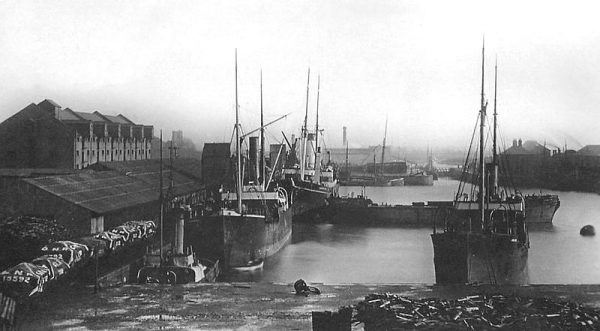
Before container ships, cargo-laden vessels would pull up directly alongside long piers jutting out from the shore. Loading and unloading them involved a chaotic mix of people and machines, all rushing to get things on and off vessels of various shapes and sizes. There would be “hundreds of people running around … guys working winches and mini-cranes , forklifts and trucks” all over the place, explains Madrigal. Goods stored in hulls were pulled up and put into cargo sheds — “the notion of the docks and of the waterfront, the charismatic place people know and understand” comes from this era of shipping.
Riding a tugboat up to a container ship in the Port of Oakland with Alexis Madrigal
Containers and their standardization fundamentally changed how docks are designed and operated. Interstitial steps were streamlined or eliminated thanks to a system of identical modules. These could be offloaded and stacked nearby then quickly loaded onto trucks and trains. Goods that had been visible moving into and out of the hulls of ships were suddenly hidden inside big modular boxes.
Containerization changed not only the ways goods are moved around the world but also the way cities work. Container ships couldn’t fit into the existing pier network, requiring ports to be redesigned to accommodate the vessels. Increased loading automation wiped out jobs but also left huge districts of relatively empty warehouses (ripe for reuse by artists and others willing to live in old industrial areas). Still, there are some jobs left in the industry for people like truck drivers, crane operators, tugboat dispatchers, skippers and captains.
In this third episode of Containers, “we go inside working life on the San Francisco Bay to see how brutal competition among shipping companies threatens the viability of the small businesses that ply the waters. Meet a tugboat dispatcher, a skipper, and the first female captain of an American freighter. It’s a case study in how globalization works and our first look at the challenges the port faces.” You can catch up with episodes 1 and 2 (above and below) and tune in for more on iTunes, Stitcher, Soundcloud, Spotify, Google Play or iHeartRadio.
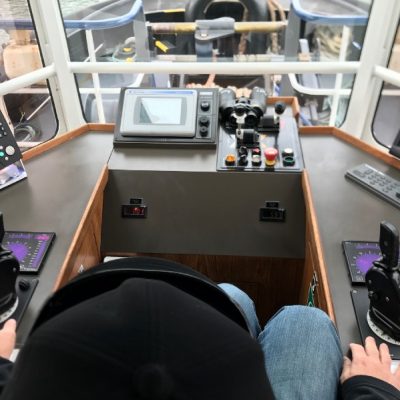
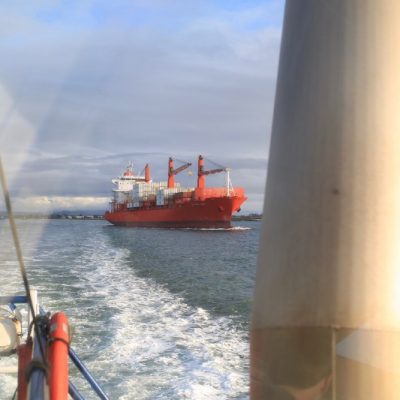
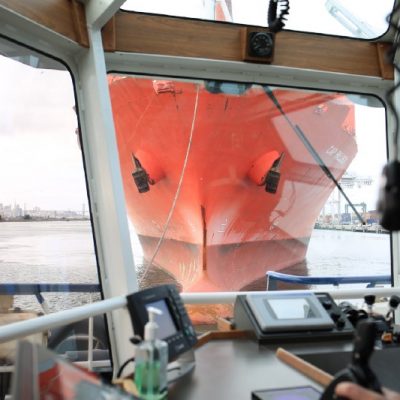
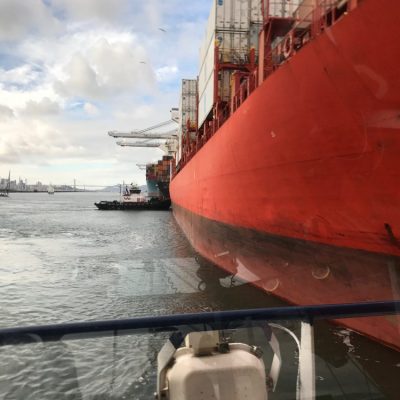



Comments (12)
Share
Dear Roman,
This episode is just incredible! I’ve lived for my whole life in port cities, born and raised in Recife/Brazil and moved for a while to Rotterdam/Netherlands. Been particularly interested in the port dynamics and how it affects the built environment. I’m working on a small thesis for my master’s program regarding the introduction of Technics associated with spatial housing development and the introduction of the container in the global trade is just the topic I was looking for. Thanks for the inspiration and if you could just e-mail me some sources of this research I would be forever in debt (my electronic address is just here).
All in all, keep up the good work, I’ll keep up the good ears to 99PI!
Kind Regards,
BM
I used to be stationed on an aircraft carrier in Norfolk, VA and was always amazed at the size of the container ships. Some of them I am pretty sure were longer and wider than our ship and aircraft carriers are pretty darn big. But no matter the size, even our ship had to have a harbor pilot to navigate from the ocean to the bay and tugs to pull us out of our pier and once again i was amazed two tug boats could move a giant aircraft carrier.
Working on an aircraft carrier sounds awesome!
That first female captain of an American freighter is such a badass!! Immense respect to her courage.
Totally loving this episode, a very refreshing change from the usual fare on podcasts!
Reading the “Container” book about 10 years ago made me think of the Internet in an entirely new way. I blogged about my ideas way back then — https://www.rss4lib.com/2008/08/rss-the-shipping-container-of/ — describing how RSS Feeds (then a novel & hip technology, now just plumbing to most people) carry news, information, podcasts — including yours! — and more to users. One simple standard format helped foster the information sharing bonanza that is the open web.
99PI is usually pretty open about the business side of podcasting, and yet you Give an entire episode over to the Container and don’t mention it’s controversial funding source even once? That’s disappointing. At least let listeners know Flexport’s role in making this.
Explain please.
I’ve listened to Containers series. I do enjoy it and see it as a love letter to industry. I assumed Flexport would be positive but I haven’t found the stories to be biased.
http://hougengroup.com/yukon-history/yukon-nuggets/white-pass-the-container-pioneers/
Great show! Also, Marc Levinson wrote a great history of shipping containers a few years ago that covers much of the same territory in detail; it’s one of my favorites:
The Box:
https://www.amazon.com/dp/0691170819/ref=cm_sw_r_cp_api_Vp-9yb3QA5DAB
Tim Harford at the BBC is also doing a series of the modern economy, and did an episode on containers,here:
http://www.bbc.co.uk/programmes/p04g1ddh
Cheers,
Are you going to do an episode this year that is not push your underlying political agenda? We get it you don’t like Trump, I listen to this as an architect/designer. If i wanted to, i would watch SNL or CNN.
Very disappointed in the Container series. It’s not about containers at all; at best containerization is a bit player in the series. You could easily remove every reference to containerization and the overall storyline would be the same. The books by Levinson (“The Box”) and Rose George (“Ninety Percent of Everything”) are a much better source of unbiased information on containers and how they’ve changed the world.
I realize that this is a petty complaint, but here we go. Alexis Madrigal made the following statement: “The old longshoreman” had “graduated high school, but only high school”. What exactly is your point Mr. Madrigal? I understand that the comment was made within the context of of a monologue regarding the “education” one could receive watching ships getting unloaded. But WTF? Really? I can only imagine the person editing this episode barely being able to contain themselves at the thought of leaving this in and letting you come off like an elitist snob. I’m sure you’re a really nice guy. I mean, you know ,,, for a guy who attended university. LOL. Great show. I sound like an idiot whenever anyone puts a mike in my face too. I just couldn’t resist.